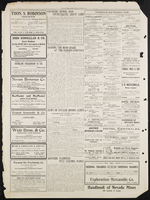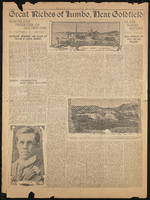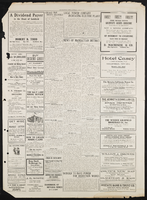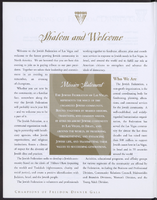Search the Special Collections and Archives Portal
Search Results
Fayle Family Photographs
Identifier
Abstract
The Fayle Family Photographs depict the Fayle Family in Southern Nevada and California from 1888 to 1990. The photographs primarily include family photographs of Leonard Fayle, Anna Louise Trapnell Fayle, Leonard Fayle’s parents George Fayle and Jean Henderson Fayle, Leonard Fayle’s siblings George Arthur Fayle and Jean Nevada Fayle, and Leonard and Anna Fayle’s children Jane and Edward Fayle. The photographs also depict the Nevada towns of Las Vegas, Goodsprings, and Jean, including railroad operations, mining, milling, and hauling freight. The collection includes a leather-bound photograph album containing images of the Fayle Family and the Yount Family.
Archival Collection

Joseph Kine interview, March 02, 1976: transcript
Date
Archival Collection
Description
On March 2, 1976, collector Debbie Nesbit interviewed Joseph Kine (born November 16th, 1906 in Elkhart, Iowa) in his home in Boulder City, Nevada. In this interview, Mr. Kine discusses working at Hoover Dam (Boulder Dam) as a high scaler. He also speaks about living in Boulder City in its very beginnings as a town.
Text
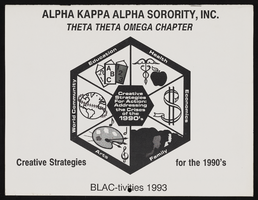
Alpha Kappa Alpha Sorority, Theta Theta Omega Chapter "Blacktivities" calendar
Date
Archival Collection
Description
From the Alpha Kappa Alpha Sorority, Incorporated, Theta Theta Omega Chapter Records (MS-01014) -- Chapter records file.
Text
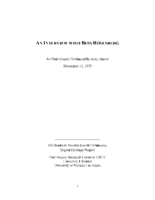
Transcript of interview with Bess Rosenberg by Jerry Masini, November 12, 1975
Date
Archival Collection
Description
Interview with Bess Rosenberg by Jerry Masini on November 12, 1975. In this interview, Rosenberg describes coming to Las Vegas in 1942, and the desert landscape. She gives an in-depth recollection of the first atomic test, and talks about different weather and the seasons in Las Vegas. Rosenberg describes several clubs and hotels around downtown and the recreation at Lake Mead and Mount Charleston.
Text

Ellen Lempe interview, March 23, 1977: transcript
Date
Archival Collection
Description
On March 23, 1977, Paul Pearson interviewed Ellen Lempe (b. 1928 in Detroit, Michigan). Lempe details her life in Sturgis, Michigan—her marriage, her kids and an automobile accident that resulted in gangrene and amputation—before moving to Las Vegas, Nevada. She recounts working as a telephone operator, gambling after work and a big win playing keno. Moreover, she describes her disinterest for politics, her husband’s love for sports and his work as a car salesman. The two end by discussing inflation and the changing attitude and landscape of the city.
Text

Transcript of interview with George Gilbert by Ruth Guidi, February 10, 1975
Date
Archival Collection
Description
On February 10, 1975, Ruth Guidi interviewed George Gilbert (born 1931 in Southgate, California) about his life in Nevada. George first talks about his education in Las Vegas and his family background. He also talks about times during World War II, the shopping facilities available to those in Las Vegas, the casinos that existed, the churches that were built, and the Helldorado parades. The two also discuss social clubs, politics, the atomic testing, environmental and social changes, the Mormon Fort, Hoover Dam, and the first movie theaters.
Text

